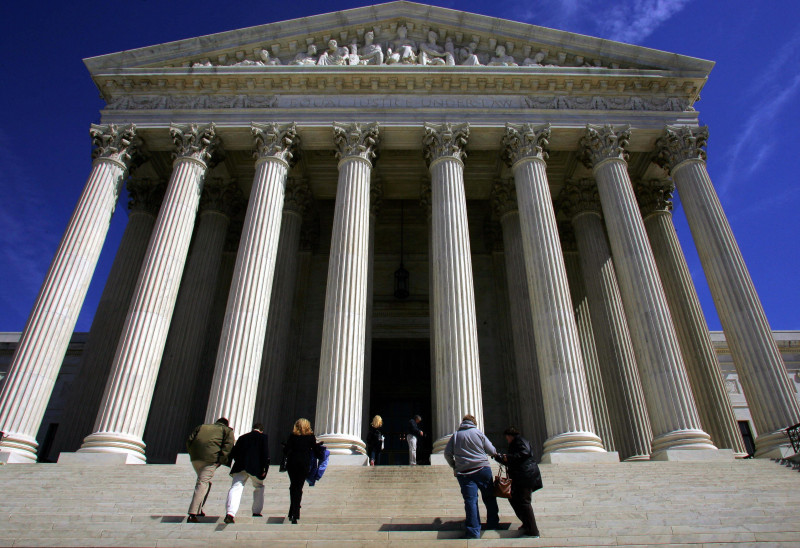Many people who find themselves suddenly without financial assistance to purchase health insurance -– especially healthy people –- are likely to give up their coverage altogether. That would lead to a so-called “death spiral”: if healthy people pull out of the insurance market in those states, insurers could no longer rely on their premiums to help pay the health care costs of the sick people in the risk pool. Premium prices would then go up, or, insurance companies might decide it’s impossible to do business in those conditions and could leave those states altogether. As premium prices go up, still more people will drop their coverage.
Again, this will not happen in California.
Insurance Sold State-by-State
“Each state has its own risk pool, so the fact that other risk pools in other states are going into death spirals, will not have any direct impact on California,” said Joel Ario, managing director at Manatt Health Solutions, a consulting firm, and former insurance commissioner in Pennsylvania and Oregon.
The insurance industry is regulated state-by-state, he explained. Even insurance companies that operate nationally, like Aetna, Cigna, and Anthem, must be licensed in each separate state.
Premium prices are also set on a state-by-state basis, and even by regions within the state. They are based on the local cost of health care and what insurers are able to negotiate with local hospitals and health care providers. (That’s why premiums are so much more expensive in the San Francisco Bay Area, where the hospital industry is quite consolidated, compared to Los Angeles, where there’s much more competition.)
But what happens outside the state -– how premiums are calculated in Florida, Texas, or other states that might lose their subsidies -– has no bearing here.
“The good news for people in California is insurance doesn’t cross state lines,” said Levitt.
Indirect Consequences
Still, Joel Ario suggests that there could be some longer-term, indirect ramifications for the 12 states, and Washington, D.C., that run their own health exchanges.
“Anytime you have a major catastrophe, like a hurricane in Florida or the Burwell case, it does affect the strength of the insurance market overall,” he said. “The weaker an insurer is, the less likely they will be competitive.”
Down the road, he said, it is possible that large national insurers who pull out of the individual market in states that lost subsidies, might decide to pull out of the individual market in other states that run their own exchanges. Or, insurers who decided to “wait and see” how things went in the first two years of the Affordable Care Act, might decide not to enter the individual market in any state. That would reduce competition.
Larry Levitt said that even that won’t happen in California.
“California is such a big state. Not one insurer will walk away from this market based on what’s going on in different parts of the country,” he said. “They’re not going anywhere."
Nicole Kasabian Evans of the California Association of Health Plans agreed.
“We’re the largest health care market in the nation,” she said. “California has embraced not just the exchange but Medicaid expansion, which makes our involvement in the Affordable Care Act even more significant and appealing to insurers.”
The vast majority of people who get their health coverage through Medi-Cal, California’s version of Medicaid that provides health insurance for the poor, are part of a managed care plan operated by an insurer. Both Anthem and Kaiser, for example, manage some of these plans, and are also big players on the exchange.
L.A. Care Health Plan, which provides coverage to low-income Los Angeles residents, covered only Medi-Cal patients before Obamacare took effect. But after, it moved into the commercial market as well, providing coverage for people who move back and forth between Medi-Cal and private coverage because of changes in their income that shift them above or below the eligibility threshold for Medi-Cal.
Policy Fallout
The lingering question for California, if the Court strikes down subsidies, is what happens when Congress starts proposing fixes. Republican lawmakers have drafted bills that would restore subsidies in states that lost them, but would also undercut key provisions of the Affordable Care Act that apply to all states, like the individual mandate that requires all people to have insurance and helps prevent death spirals.
“That would have an effect on the insurance market, including California,” Ario says. “But I don’t think any of those [bills] will pass.”
Health advocates say Democratic lawmakers would object to such proposals.
"It is impossible to imagine President Obama, or Democratic Congressional leaders like Nancy Pelosi of California ... agreeing to a compromise that undermines coverage and access to care in their home state," said Anthony Wright, executive director of Health Access.
